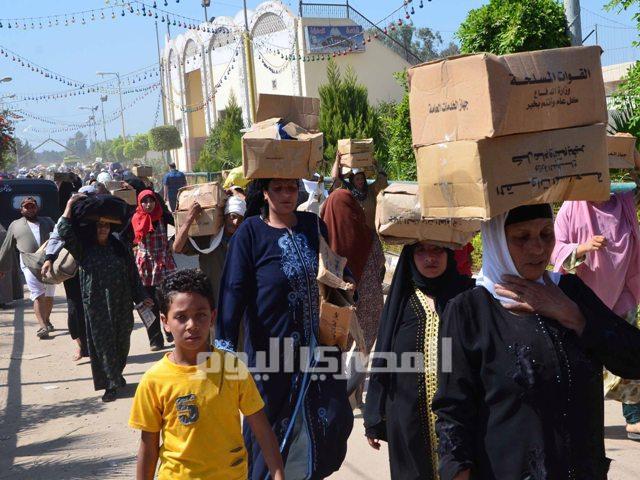
Minutes after breaking a two-day hunger strike, Samir Abdel Hady, a health employee from the village of Tahseen in Daqahlia, leaned against the wall with a look of sheer exhaustion in his eyes.
It was despair rather than food deprivation that seemed to have taken its toll on the father of two, who was among more than 20 of the village’s residents who went on a hunger strike as part of the village’s protest movement, now in its second week.
Earlier this month, the village announced a campaign of civil disobedience that includes refusing to pay any government utility bills and boycotting schools.
Residents are demanding a paved road to connect them to the rest of the governorate.
After negotiations failed between village leaders and the governor, the village announced its administrative independence from Daqahlia Governorate last Saturday, while maintaining that it remains under the sovereignty of the president and military.
Abdel Hady chokes up as he explains that having been completely ignored by the government since its founding 60 years ago, the village residents are now at their wits’ end, feeling “as if we were not on the map of Egypt, as if we were not even human.”
“We are not thinking about ourselves; we’re thinking about the new generation. We have suffered a lot and we don’t want them to go through the same thing,” says Abdel Hady. “If the government doesn’t start treating us as part of this country, we might as well announce our complete separation.”
Tahseen residents say that since they have already been doing everything for themselves, announcing their separation from the governorate will only be formalizing the current situation.
Since its establishment in the 1960s, generations of the village residents have built it up from scratch, based on a self-sufficient system they devised themselves.
Local leaders are elected in the village and whenever a service is needed, they hold a general meeting of the village’s approximately 5,000 residents to decide on the amount to be collected from each family. Those who can’t afford their share pay in commodities.
Using this method, Tahseen was able to provide water, sewage, a mosque and a school to its residents. However, because the projects depended mainly on local architects, workers and equipment with little outside help, most of the services are weak.
Sewage pollutes irrigation water, and most buildings are made with red brick. Many are in danger of collapsing.
“How can a village be completely forgotten for 60 years? Is this even possible?” wonders Abdel Salam bitterly, regretting that the village residents have had to pay for vital services, which the government is legally responsible for, in order to survive.
With no medical services, government offices or education beyond the primary grades, residents have to commute to the neighboring town of Beni Ebeid for work and errands, and children have to make the return journey daily for school.
It’s dangerous — Tahseen and Beni Ebeid are separated by a four-kilometer-long, narrow, bumpy dirt road with no lighting, surrounded by fields on one side and a water channel on the other.
The unpaved, muddy and dark road has been the scene of rape, cars toppling into the water channel and miscarriages among heavily pregnant women trying to reach the hospital in Beni Ebeid. Additionally, the residents say they are completely locked in when it rains because the road turns into mud and becomes impassable.
“This road is our lifeline. Without it, we are isolated from the world,” says village resident Soheir Hassan. “This is not a small problem. We send our kids to school and stay terrified until they come back. Teachers who come to them get raped on the road. No one comes to our funerals.”
Hassan echoes Abdel Hady, saying their demands should not be out of reach.
“We have been taking from the money that’s supposed to feed our children to do everything for ourselves, but now we’re tired,” she says. “We’re not asking for the impossible, we just want to live like human beings.”
Willing to endure all the other problems, the residents are holding on to one demand — a written commitment from the governorate to allocate about LE3.5 million necessary to pave the road in this year and next year’s budgets.
Mostafa Salah, a lawyer and a resident of Tahseen who has been delegated to negotiate on behalf of the village, says the residents are willing to escalate their protest even further if the government doesn’t comply.
In addition to the declaration of independence and the ongoing civil disobedience, Salah says the residents are willing to evacuate the village of its 5,000 members and camp out at the governorate and the presidential palace, in addition to inviting other villages to join a movement that would be called the “Deprived Villages of Daqahlia Union.”
The village residents put their hunger strike on hold last Wednesday after a deputy governor gave them a copy of a written request to the governor to allocate LE1 million for the road in this year’s budget. But when the governorate refused to provide a written commitment to allocate the rest of the sum needed to finish the road for next year’s budget, they escalated their campaign.
They say that paving only part of the road squanders public funds, since it has been done before, and because the rest of the road remains damaged, it ends up destroying the paved parts.
The governor has already given in to two other demands raised by Tahseen residents. He approved funding for a new mosque, and a new local school — built by the military on land residents had bought themselves — was furnished and opened during the first days of residents’ protest. The old mosque and the old school are both closed because they are hazardous.
Samy Abul Ela, an Endowment Ministry imam and former member of the city senate in Beni Ebeid, says the continued corruption in the municipalities is the reason why Tahseen has not been getting its share of the governorate’s budget.
“Every time we asked for a budget for Tahseen, they allocated the money for services for other villages where there are members of Parliament residing,” says Abul Ela.
But village residents say they are done paying the government and doing everything for themselves.
“This is the final battle. We are at a point where we’re ready to die — we’re willing to sacrifice a few of us so that our kids live a better life,” says Abdel Hady, standing in the middle of the cloud of dust that’s constantly engulfing the village.
This piece was originally published in Egypt Independent's weekly print edition.



